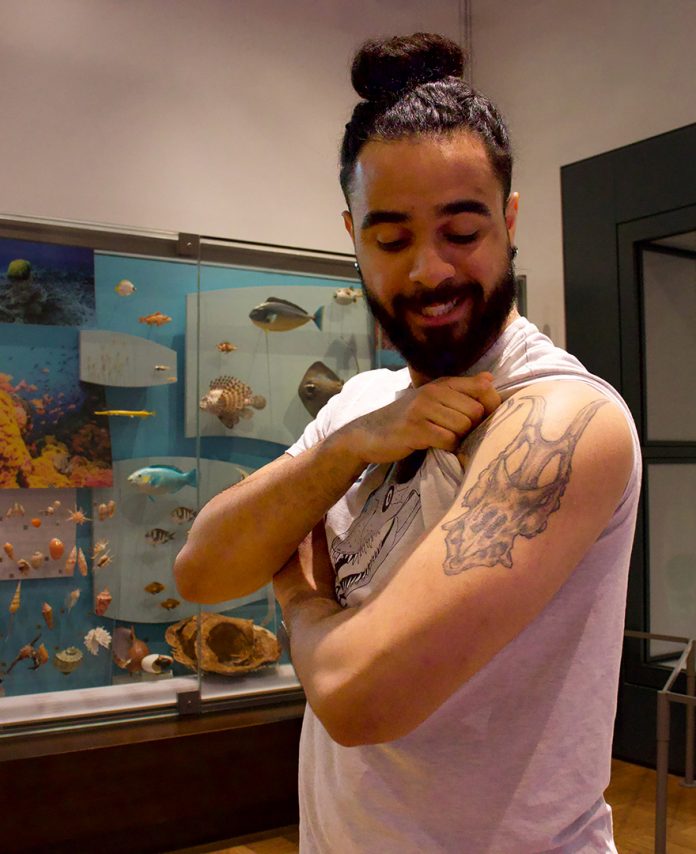Aidan Dale wants to change the way people perceive reptiles and amphibians. The 27-year-old Brampton resident is working to inspire the next generation of conservationists by turning a childhood fascination with dinosaurs and prehistoric life into a passion for protecting the reptiles and amphibians that exist today.
“A lot of people have a very skewed view of reptiles and amphibians and other creepy crawlies, and it’s a very surface-level fear,” said Dale, who is working to start a business called Sauropsida: Ecology Conservation and Prehistoric Education to help people empathize with animals that aren’t typically seen as cute, cuddly, or worthy of protection.
“This business has given me an excuse to talk about my favourite things,” said Dale.
In the summer, Dale also works for the Heartlake Turtle Troopers in Brampton. Through this work, he has seen firsthand the dangers facing Ontario’s turtle and snake populations. As a Turtle Trooper, Dale helps turtles cross roads safely, conducts surveys, monitors egg-laying females, and collects data to protect their habitats.
According to Statistics Canada, about 265 to 400 Blanding’s turtles are killed on Canadian roads each year, while snakes can face a similar fate. A 2021 study by Wildlife Preservation Canada found that over 60 percent of snake species in Canada, which are often located at the northern edge of their range, are currently at some level of risk.
“My goal is to help the average person not want to kill a snake on sight,” said Dale, adding he wants to “broaden people’s horizons and empathy towards the natural world and realize that we’re all here sharing the planet.”
His interest in this field began with dinosaurs at two years old and expanded into connecting modern and prehistoric ecologies. His passion has led to roles as an educator at a reptile zoo, zookeeper, conservation groups, ROM (Royal Ontario Museum) as a biodiversity gallery facilitator and Little Ray’s Nature group at Ripely’s Aquarium.
He said that many children grow up learning about dinosaurs, reptiles and amphibians but later do not pursue it as a career because these interests are not supported.
“People treat it as a phase: ‘Oh, he is in his dinosaur phase, or she is in her dinosaur phase, she’ll grow out of it,’ but the kids only grow out of that stuff if it’s not nurtured,” said Dale, whose parents supported his interest by offering volunteer opportunities at Reptilia, buying him books and toys, and taking him to zoos, museums and other locations to explore new specimens and foster learning.
“If you nurture this interest, it could grow into something. It doesn’t have to be a career, but it can be something that they have a passion for and could volunteer,” he said. “It’s little things that get people engaged for citizen science.”
He suggests that the biggest stereotype in conservation work is how animals are handled and viewed. However, conservation workers are trained to use different tools and methods when handling animals.
Alex Van Bell, a wildlife educator and caretaker at Sciensational Snakes, explained how to properly handle amphibians and why it’s important to limit contact.
“Amphibians don’t do well with handling because the oils on our skin can make it difficult for them to breathe. It’s best not to handle them for too long, as it can harm their health, especially if you have anything on your hands that could be transmitted to them,” said Bell.
In addition to amphibians, other wildlife, such as turtles, also require careful handling. “Turtles are slimy because they swim in water that they also do their business in so we encourage no hands-on paternal, as much as people want to hold them,” said Bell. Snakes are suggested for hands-on learning due to their physical nature.
“The snakes are cleaner and drier than the turtles, so if you were to hold a reptile, please do it with one of the snakes,” said Bell.
While snakes are better suited for hands-on learning, handling animals in general requires much more than just physical interaction.
“People think that all I do is just hold animals all day, go around and catch animals, putting my head inside a crocodile, but no, there is a lot of respect, patience and effort that’s put into this,” said Dale.
Through his business, Dale hopes to work at schools, libraries, public spaces and events and encourage a lifelong love of reptiles and amphibians.
Another common misconception he often hears is that he’s a crocodile hunter.
“I’m not Steve Irwin. People think I’m going into the bush, diving off a cliff to catch something, handling venomous snakes with my bare hands,” he said. What he is trying to accomplish, is a broader appreciation and respect for these reptiles and amphibians.
He encourages anyone interested in this subject to use local resources and work with others to further their interest in this field.
“If you are truly interested in something and you can see yourself doing this for the rest of your life, don’t let anyone say otherwise,” said Dale.




